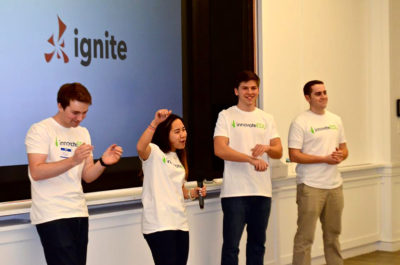
Some members of Boston University’s Entrepreneurship Club will take part in InnovateEDU, a semester-long student-run startup program, along with students from local universities. The entrepreneurship program, now in its second cycle, is filled with workshops and competitions designed to help students network with local aspiring entrepreneurs and strengthen innovation skills, said BU participant Saloni Shah.
In collaboration with Northeastern University, Emerson College, Boston College and Massachusetts Institute of Technology, the program hosts workshops at all participating universities and culminates in a final business plan competition, Shah, a College of Arts and Sciences junior, explained.
Co-founder of InnovateEDU and vice president of BU’s Entrepreneurship Club, Joshua Surette said the program exposes participants to ideas from students across the Greater Boston area.
“A lot of groups try to push out the next great company, but our strength is that we’re a bridge between universities in Boston,” the College of Engineering senior said. “We get things that venture capitalists would actually look at, avoid common entrepreneurship pitfalls, then push out into Boston.”
InnovateEDU is mainly run by students, he added. While there is some faculty involvement in the program, Surette said it is mostly to help with funding and resource allocations between the universities.
“We’re trying to keep faculty out of it to keep students running it,” Surette said. “[We] don’t want any one university to get more credit [than another].”
BU Director of Entrepreneurship Activities Ian Mashiter further emphasized the importance of inter-university collaboration.
“[It’s] an opportunity to meet folks from other campuses and get exposed to other opinions, build their network,” said Mashiter, a lecturer in the Questrom School of Business. “I collaborate with a lot with faculty from other universities so it’s nice to see that it’s an opportunity for students.”
InnovateEDU is structured around three main pillars: connect, educate and ignite, Shah said. The connection aspect is accomplished through collaboration, while education takes place through workshops and sessions, in which students get hands-on experience creating their own businesses.
Shah, who is BU’s team director, said that while there is collaboration between the universities, teams are composed of members from the same school.
“Each university has their own application process. The goal is to build up Boston entrepreneurship workshops at each school,” Shah said. “All [universities are] involved in planning and resources.”
Despite the competition at the end of the InnovateEDU semester, the informative sessions focus on cooperation and communal learning. Students both learn and work with their teams to develop their final project.
“[The sessions] are a chance to network with other like-minded people from other campuses, and formal get-together sessions alternate around different campuses,” Mashiter said.
The “ignition” element comes at the end of the program when students can join internships or startups with resources provided by InnovateEDU.
Although this is InnovateEDU’s second semester, its leaders are looking at ways to make it a self-sustaining program.
“[We] didn’t expect it to be as successful as it was, so we’re looking to solidify the bridge between universities and the professional community,” Surette said. “[Also], we’re starting to look for ways to keep alumni involved and engaged, now that the program’s more solid.”
Several BU students expressed interest in the program and its goal of helping students build networks before graduation.
Antonella Tanga, a ENG junior, said she had not heard about the program before and expressed interest in applying for it.
“It seems very interesting, but also very intense,” she said.
Matthew Smith, a Questrom sophomore, said that InnovateEDU sounded similar to Questrom’s Cross Functional Core program, in which students spend a semester developing a new product or service.
“If I could fit it in my schedule, I think [InnovateEDU] would be really interesting,” Smith said.
In addition, Smith said that networking, which InnovateEDU underscores, is “one of the most underrated aspects of college.”
Nabil Tawil, a CAS sophomore, also said that networking is important for students, regardless of their field.
“Working with people at the different universities, you sort of build your web more which makes it easier for you to get your ideas across,” Tawil said.




